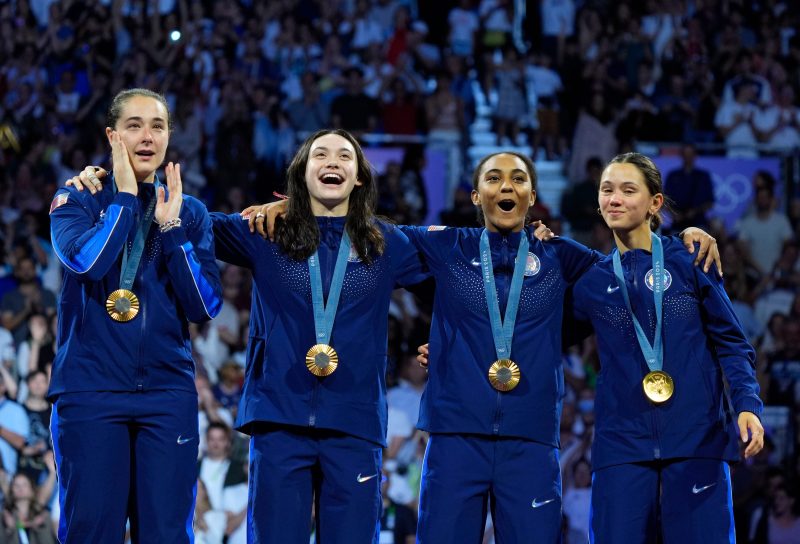PARIS – They were cruising towards the first gold medal in American team fencing history, up 10 comfortable points in the penultimate eighth round.
And as Italy slowly whittled its deficit down to eight points by the end of the round, then in a flash four and then three, Lauren Scruggs – the anchor and breakout star of the U.S. women’s foil program at these Paris Olympics – steeled herself against the walls she felt closing in.
“I think mainly it was like, you don’t want to be the person to lose the bout so I think luckily I had a big lead and it gave me some time to kind of get my bearings together,” Scruggs said. “I was able to buckle down and finish out the bout, but I think a lot of that just came from my pride. I’m a very prideful person and so at the end you really saw me use every last ounce of strength to just battle out and get those touches.”
Scruggs scored three consecutive points to close the match and flipped off her mask in stunned disbelief when she touched Italy’s Arianna Errigo to give the U.S. a historic 45-39 win.
Scruggs, Lee Kiefer, Jacqueline Dubrovich and Maia Weintraub became the second group of American women to medal in the 64-year Olympic history of women’s team foil and the first United States fencing team of any gender or any weapon to win gold.
2024 Olympic medals: Who is leading the medal count? Follow along as we track the medals for every sport.
The U.S. women won their only other medal in team foil, a silver, in 2008.
With the win, the U.S. avenged a loss in the bronze-medal match to the top-seeded Italian team at the 2020 Olympics in Tokyo and cemented itself as a new power in foil.
Kiefer beat Scruggs, 15-6, in the individual foil final and is the first American woman to win three fencing medals. Scruggs, 21, gave the U.S. its first ever 1-2 finish in individual foil and leaves Paris with two medals, a silver and gold. Dubrovich, 30, announced her retirement after the match, but both she and Weintraub, an Olympic newcomer, made important contributions Thursday as the U.S. showcased its depth.
Kiefer and Scruggs put the U.S. ahead 10-5 after two rounds, and when Italy tied the match at 12, Dubrovich scored three points in a row for some much-needed breathing room. Weintraub, similarly, staved off an Errigo rally in her first Olympic bout.
“It is still shocking and I think it will be for some time,” Dubrovich said. “We all knew we could do it. We have a very talented team and it’s – yeah, it’s surreal. It’s surreal that it all came together finally in the most important moment and we had glimpses throughout these last three years. But for it to come together at the biggest stage for fencing is very beautiful.”
Dubrovich said Thursday’s match marked the final competition of her career. She’s been engaged for almost five years and plans to get married, start a family and resume her marketing career.
“I put a lot of things on hold and I’m very content with this being my last time,” Dubrovich said. “My soul knows it’s the end of a journey.”
Kiefer, 30, declined to discuss her future plans, but has seen the rise of the U.S. women’s foil team since her first Olympics in 2012.
She lost to eventual silver medalist Errigo in individual foil that year and was part of the U.S. team that was beaten 45-23 by the Italians with a bronze medal on the line in Tokyo.
She attributed the team’s rise to a mix of great coaches, talented fencers and more commitment from USA Fencing.
“I started fencing these level competitions when I was 14 and often we wouldn’t even make the second day of competition,” she said. “And for many years I could never even fathom being on a podium at a World Cup, and slowly we broke through, we got there and then we got to world championships, and then here we are the Olympic Games, so it’s taken many years.”
Contact Dave Birkett at dbirkett@freepress.com. Follow him on X and Instagram at @davebirkett.






